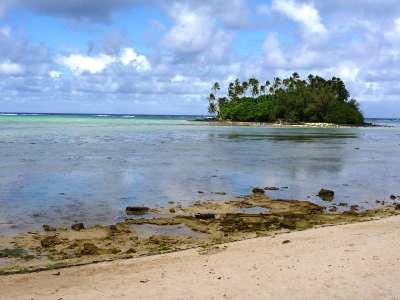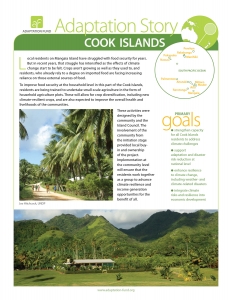The Cook Islands, a group of 15 small islands scattered over 2 million square kilometers in the southwestern Pacific Ocean, are highly vulnerable to cyclones, drought, coastal erosion, and sea-level rise. The project focuses on the remote Northern Group of Pa Enua, more than 1,250 km from the capital, is made up of seven low-lying, sparsely populated, coral atolls and sand cays, with little arable land. Some of these islands benefit from large, productive lagoons that support the farming of pearls, the country’s leading export. They are also the main base for the fishing industry of the Cook Islands. The islands of Pa Enua are particularly hard hit by drought and by cyclones and storm surges, due to their low relief and critical dependence on rainfall for day-to-day water supply. Indeed, vulnerabilities to natural disasters exacerbated by climate change have become so acute that people are steadily leaving the Pa Enua migrating to the southern Cook Islands and overseas.
Objectives: This programme’s objective is to strengthen the ability of Pa Enua, and all Cook Island communities, to make informed decisions and manage anticipated climate change driven pressures in a proactive, integrated and strategic manner. To accomplish this goal, the programme aims to help strengthen national institutions, enhance coordination of efforts at the national level, and ensure more effective delivery of national initiatives at island and community level. Another focus will be on ensuring that staff in the relevant national agencies and organizations have the ability to support island and community development initiatives that build resilience to climate change. The programme also plans to produce a framework for the delivery of reliable and targeted information on the impacts of climate change on terrestrial, marine, and coastal ecosystems in the Pa Enua. Each of the 11 inhabited Pa Enua will produce integrated climate change adaptation and disaster risk reduction action plans to guide the implementation of the climate change adaptation and disaster risk reduction measures. Community-based climate-change adaptation and disaster risk reduction measures will be implemented in relation to crop production, coastal protection, fisheries, tourism, and health and water resources management. Lessons learned and best practices will be collated to improve the effectiveness of the initiatives.
Learn more
- Article by UNDP, December 2018: Moving with the Times: The Cook Islands is embracing technology for climate action
- Read the Cook Islands Adaptation Story
- Photo stories on UNDP Exposure:
- UNDP project page
- Project description on UNDP Climate Change Adaptation
| Project Component 1: Strengthening and implementing climate change adaptation and disaster risk reduction at national level | US$ 400,000 |
| Project Component 2: Strengthening capacities for climate change adaptation and disaster risk reduction in the Pa Enua | US$ 785,000 |
| Project Component 3: Implementing climate change adaptation and disaster risk reduction measures in the Pa Enua | US$ 3,215,000 |
| Project Component 4: Climate change adaptation knowledge management | US$ 100,000 |
| Project/Programme Execution Cost | US$ 460,000 |
| Total Project/Programme Cost (= Project Component + Execution Cost) | US$ 4,960,000 |
| Implementing Fee | US$ 421,600 |
| Grant Amount (= Total Project/Programme Cost + Implementing Fee) | US$ 5,381,600 |
Project Documents
| Attachment | Type | Size |
|---|---|---|
| Project concept | 372 KB | |
| Project document | 2 MB | |
| PPR1 (for web) | XLS | 384 KB |
| PPR2 (for web) | XLSX | 174 KB |
| PPR3 (for web) | XLS | 415 KB |
| PPR4 (for web) | XLSX | 335 KB |
| Mid-term evaluation report | DOCX | 1 MB |
| Final evaluation report | 959 KB | |
| Other project order | 1 MB |



